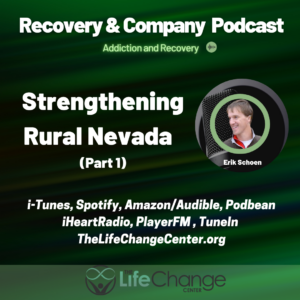When most of us think of addiction problems we tend to picture large cities. The truth is that rural areas often have a bigger problem with substance abuse. Lack of services, poverty and isolation make it even harder to address these challenges. Of course, increased isolation due to Covid further exasperated these needs. Here in Nevada, we are seeing a huge shortage in services according to Erik Schoen. Erick is the Executive Director of Community Chest, providing mental health and substance abuse counseling to residents in rural Nevada.
Erik was also a recent guest on the Recovery and Company Podcast. According to Erik, every rural county in Nevada is considered a health provider shortage area, meaning they are all medically underserved. This includes the full range of medical and mental health services which includes substance abuse counseling. Simply put, there are not enough clinicians to meet the needs.
With the opioid epidemic, and rising overdoses due to drugs like Fentanyl, the increased need is overwhelming. Unfortunately, we are likely years if not decades away from having enough licensed clinicians to help. According to Erik, substance use and mental health caseloads have increased by fifty percent since the Covid pandemic. He says the rate of addiction tends to be even higher than what we see in the urban areas.
While this sounds pretty bleak, there is hope. The solution to fighting addiction in rural areas lies in mobilizing the people that already live there. If it sounds like we are referring to neighbors helping neighbors, you would be correct. Although there is a little more to it than that.
Erik said they have tried the professional model of importing clinicians, but often times they lack ‘buy in,’ which creates heavy turnover. This turnover often causes clients to feel traumatized all over again. The general feeling is: “why should I develop a relationship with this person, they are just going to leave.”
Organizations like Community Chest are invested in developing homegrown talent. They do this by finding individuals in each community who are willing to walk alongside others within the community. These individuals are identified and trained as peer support specialists and community health workers. In addition, these positions are paid which strengthens the workforce in these rural areas.  Not to mention these are individuals who already have earned authority within their communities. This opens up the capacity for mental health professions to treat the more acute mental health and substance use disorders in these rural areas.
Not to mention these are individuals who already have earned authority within their communities. This opens up the capacity for mental health professions to treat the more acute mental health and substance use disorders in these rural areas.
This model incorporates many techniques used in the third world where resources are even scarcer. For instance, in my personal travels to Haiti and Guatemala, I’ve seen several relief organizations use community mobilization to provide jobs and meet the needs of individuals. While certain resources are initially provided like schools, food, water, housing, and mental health care; training is also provided to community leaders who step up to help. In this way, local labor can run the projects and the community can often become self-sufficient. While these projects are geared toward meeting basic needs, the same model is applied when employing community members to help meet mental health challenges in rural areas.
When asked if there is resistance to these types of initiatives in rural areas, Erik said the pandemic helped us realize the importance of emotional health, mental health, and substance abuse treatment. He said there is really no longer an argument that investing in these community enterprises and having easy access to treatment is vital to all communities.
This blog is just a snapshot of all that was covered in our 2-part episode with Erick called Strengthening Rural Nevada. Check out these episodes and many more on the Recovery and Company Podcast.

